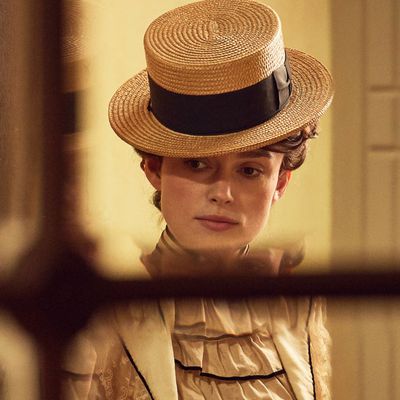
This review originally ran during the Sundance Film Festival.
One of my favorite music videos is Michel Gondry’s piece for Björk’s 1997 single “Bachelorette,” which depicts the Icelandic pop star as the author of a book so big it eclipses her. She takes it to a publisher, it’s a hit, it’s mass-produced, and sooner or later the theater comes calling to adapt it. Björk goes to the premiere and watches the story we’ve just seen unfold onstage at a smaller, slightly more rinky-dink scale, all the way up to the point where, again, the theater comes calling and stage-Björk goes to the premiere of her play-within-a-play. And so on and so forth, with increasing flatness and flimsiness in each telling.
There’s a scene in Wash Westmoreland’s Colette that is reminiscent of the Gondry video, in which Sidonie-Gabrielle Colette (Keira Knightley) attends the premiere of the stage adaptation of her runaway hit book Claudine à l’école, a largely autobiographical, diaristic novel that was published under her husband Willy’s (Dominic West) name. She watches the stage-her read her words, wearing her haircut, in front of a flat background painting that is a faint approximation of the verdant countryside of her youth. And she’s not sure how she feels about it. Of course, if this was the Gondry video, Colette itself would be somewhere in the middle stage of the adaptation nesting doll, and the film, as spry and witty as it is, reflects that, vacillating between two and three dimensions almost on a scene-by-scene basis.
The real Colette was an upstart among the fin de siècle bohemian scene in Paris, a young bride to notorious writer and critic Henry Gauthier-Villars (known by his pen name Willy) who soon surpassed his fame and renown with her explicitly female-oriented novels and plays. She’s unimpressed with Willy’s salons and libertine crowd at first, and it doesn’t take long for him to resume the philandering, indulgent lifestyle that earned him his reputation. But Colette surprises him by expressing an interest in other women as well, and soon husband and wife are seducing their way through every disreputable heiress in Paris.
An unrepentant faker, Willy has a “factory” of writers working for him, and soon enlists Colette among them — at the bargain price of free. Her first novel, a bildungsroman based on her adolescence and colored with enough Sapphic overtones to make all of France reach for their fans, takes off and makes a cultural icon out of Willy and the thinly veiled heroine Claudine. Success demands more success, and soon Willy is going so far as to lock Colette in her room, forcing her to produce sequels. Willy burns through the profits, Colette produces another smash hit, rinse, repeat.
Westmoreland’s film is richly art-directed; the fads and trends of French society are a supporting character, given Claudine’s huge impact upon them. But the filmmaking itself never quite feels as abundant as its heroine’s ever-active mind and the colorful experiences that make their way to her pages. Knightley always feels a little at arm’s length; even her rebellious moments are a little cold, and she never quite feels like the icon of female liberation that she is meant to. The other iconoclastic women that cross her path, however briefly, leave more of an impression, particularly Aiysha Hart as the provocative actress that plays Claudine in the play, and Denise Gough as Mathilde de Morny, a.k.a. Missy, the casually confident cross-dressing noblewoman with whom Colette has a long-term affair.
But as a story of a woman who eventually asserts her creative independence and fights for the artistic credit she deserves, Colette is more satisfying intellectually than sensually. Westmoreland’s script falls into a very familiar kind of biopic lockstep through its subjects’ life events (many scenes, especially in the first half of the film, take place years apart from each other, making it hard for the film to settle into an intimate rapport with its characters). But it’s also whip-smart and crackling with some legit bon mots. (“I can read you like the top line at an optometrist’s office,” Colette tells Willy during an argument.) These are fun, mischievous, and intelligent characters to spend time with, even when they’re behaving less than nobly. The film may perhaps face criticism for being too polite to turn Willy into an irredeemable villain until the final minutes, but the ups and downs of Colette’s relationship with him is one of its more nuanced features. Politeness may be the film’s weakest point, whether with its characters or bedroom scenes. But it’s hardly something to complain about, especially when the company is this lively.

